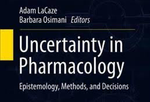A key theme in the philosophy of medicine examines the ways in which evidence should inform decisions—individual therapeutic decisions, guideline development and regulatory decisions.
In broad terms, this project seeks to address some of the following questions:
- What is the relationship between different types of biomedical evidence, including the mechanisms of basic medical science, evidence from randomized studies and the outputs of modelling and simulation approaches?
- How should we characterise “causation” in the biomedical sciences? What types of evidence give good grounds for inferring causal relationships?
- What are the barriers in translating advances in the basic sciences to improvements in health?—how do we overcome them?
- What conditions are necessary for a successful confirmatory randomized trial?
- When are randomized trials ethically permissible?


